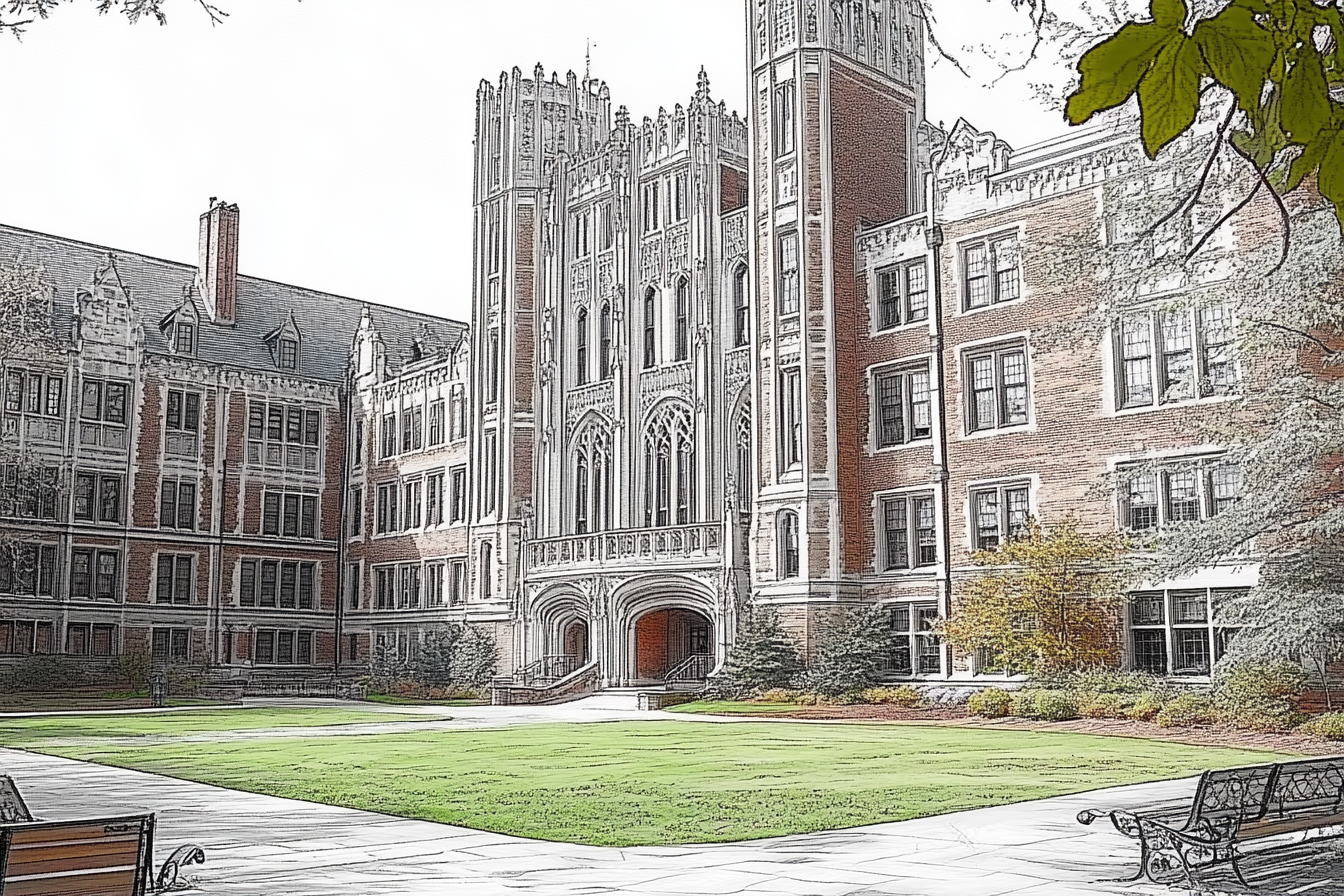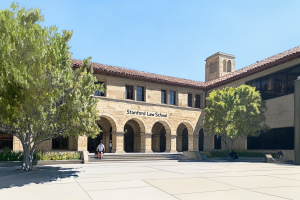The Armenian Lawyers’ Association and Iravaban.net are relaunching their special project “Law Schools Abroad”. This initiative aims to introduce Armenian readers to the world’s leading law schools, showcasing their unique features, curricula, and opportunities for international students. Karen Zadoyan, President of the Armenian Lawyers’ Association, is the visionary behind this special project.
This special project will help those interested in law, Armenian law students, and lawyers gain a better understanding of international legal education. It will also promote the professional development of Armenian lawyers in a global context.
Iravaban.net’s journalists and experts will present detailed and engaging stories about each law school. This special project will be innovative, utilizing the latest technological tools. We will ensure the information is up-to-date and visually compelling.
To enrich our stories, we will use AI-generated images. These images are artistic interpretations inspired by descriptions of the law schools and their programs. They are designed to provide visual accompaniment to our articles, stimulate imagination, and increase engagement. However, it’s important to note that these AI-generated images may not accurately represent the actual appearance of the schools or their facilities. They are creative visualizations intended to complement our written content and should be viewed as illustrative rather than documentary material.
Our goal is to provide a rich, multimedia experience that brings these prestigious law schools to life for our readers, combining factual reporting with innovative visual elements. We believe this approach will make the complex world of international legal education more accessible and engaging for our audience.
This installment of our special project spotlights Yale Law School, a preeminent legal educational institution in the United States and worldwide.
1․ Introduction
Yale Law School stands as a beacon of legal education in the United States. It’s renowned for its exceptional educational programs, groundbreaking research, and world-class faculty.
Founded in 1824, Yale Law School is located in New Haven, Connecticut. As an integral part of Yale University, it boasts a diverse community of approximately 600 JD (Juris Doctor) students. The school takes pride in its innovative approaches to legal education and its diverse student body.
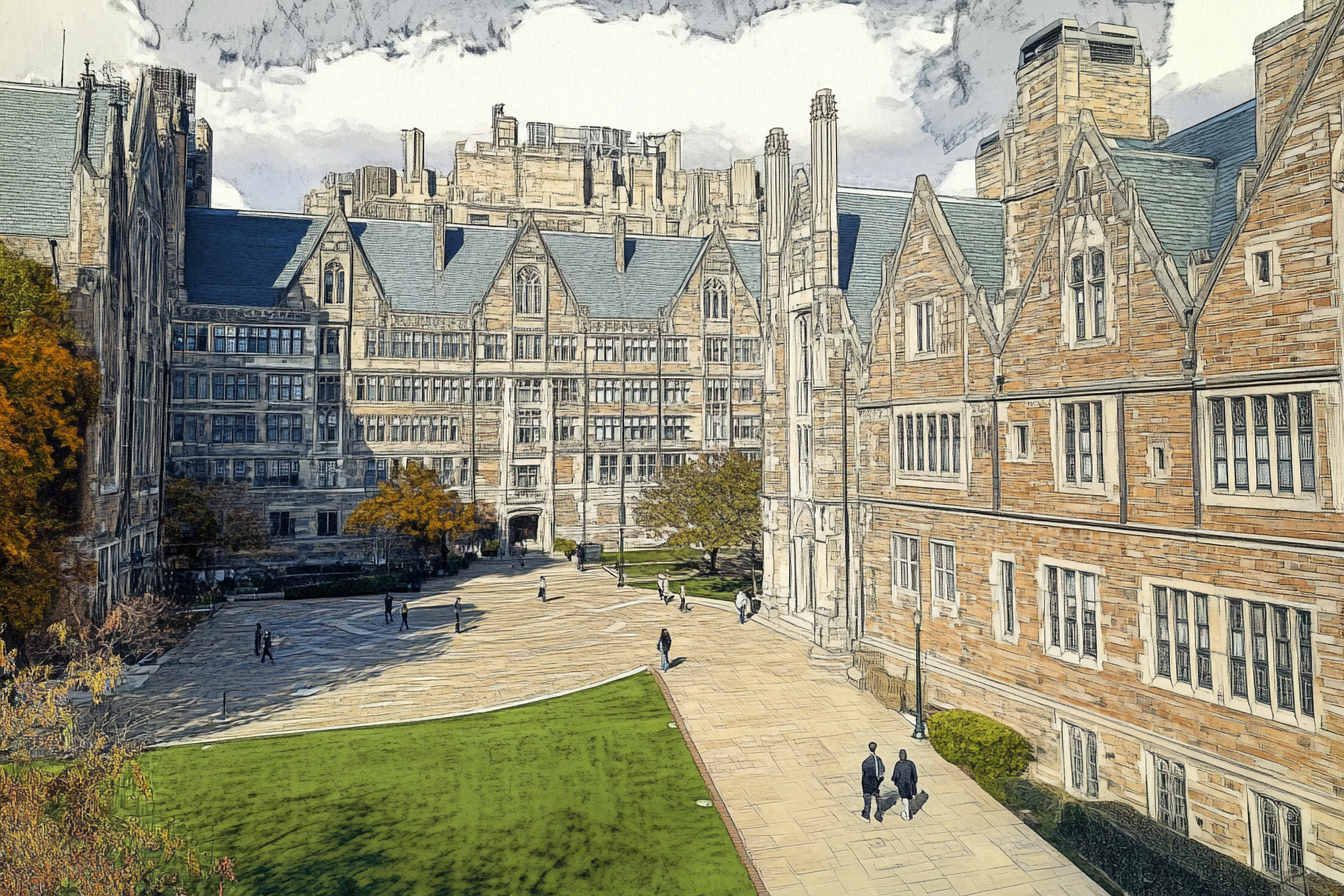
The image symbolizes the Yale Law School campus.
2․ Founding History
Yale Law School’s origins are deeply intertwined with Yale University’s rich history. Established in 1824, it holds the distinction of being one of America’s oldest law schools.
David Daggett, Yale College’s inaugural law professor, was the driving force behind the school’s establishment. His vision was to elevate law from a mere craft to a scientific discipline.
3․ Rankings and Reputation
Yale Law School’s stellar reputation is reflected in its consistently high rankings. In the 2024 U.S. News & World Report rankings, Yale Law School shares the top spot with Stanford Law School among 196 law schools in the United States, achieving a perfect score of 100 in the overall rating.
Key performance indicators include:
- Peer assessment score: 4.5/5
- Lawyers/judges assessment score: 4.5/5
- Acceptance rate: 5.6%
- Student-faculty ratio: 4.4:1
- Graduates employed 10 months after graduation: 98.6%
- Bar passage rate for first-time test takers: 95.8%
Yale Law School also excels in specialized areas:
- #2 in International Law
- #3 in Constitutional Law
- #5 in Clinical Training
- #7 in Contracts/Commercial Law
- #8 in Business/Corporate Law
Admission statistics underscore the school’s rigorous standards:
- GPA (25th-75th percentile): 3.89-4.0
- LSAT scores (25th-75th percentile): 172-177
These outstanding rankings and metrics reflect Yale Law School’s academic excellence, distinguished faculty, and the remarkable success of its graduates.
Faculty and Academic Excellence:
Yale Law School boasts a faculty that’s widely recognized as one of the world’s finest. It includes leading legal scholars, former judges, and high-ranking government officials. The professors are celebrated for their pioneering research and active engagement in critical societal issues. Faculty members frequently serve as expert commentators in the media, provide testimony before Congress, and offer consultation to international organizations.
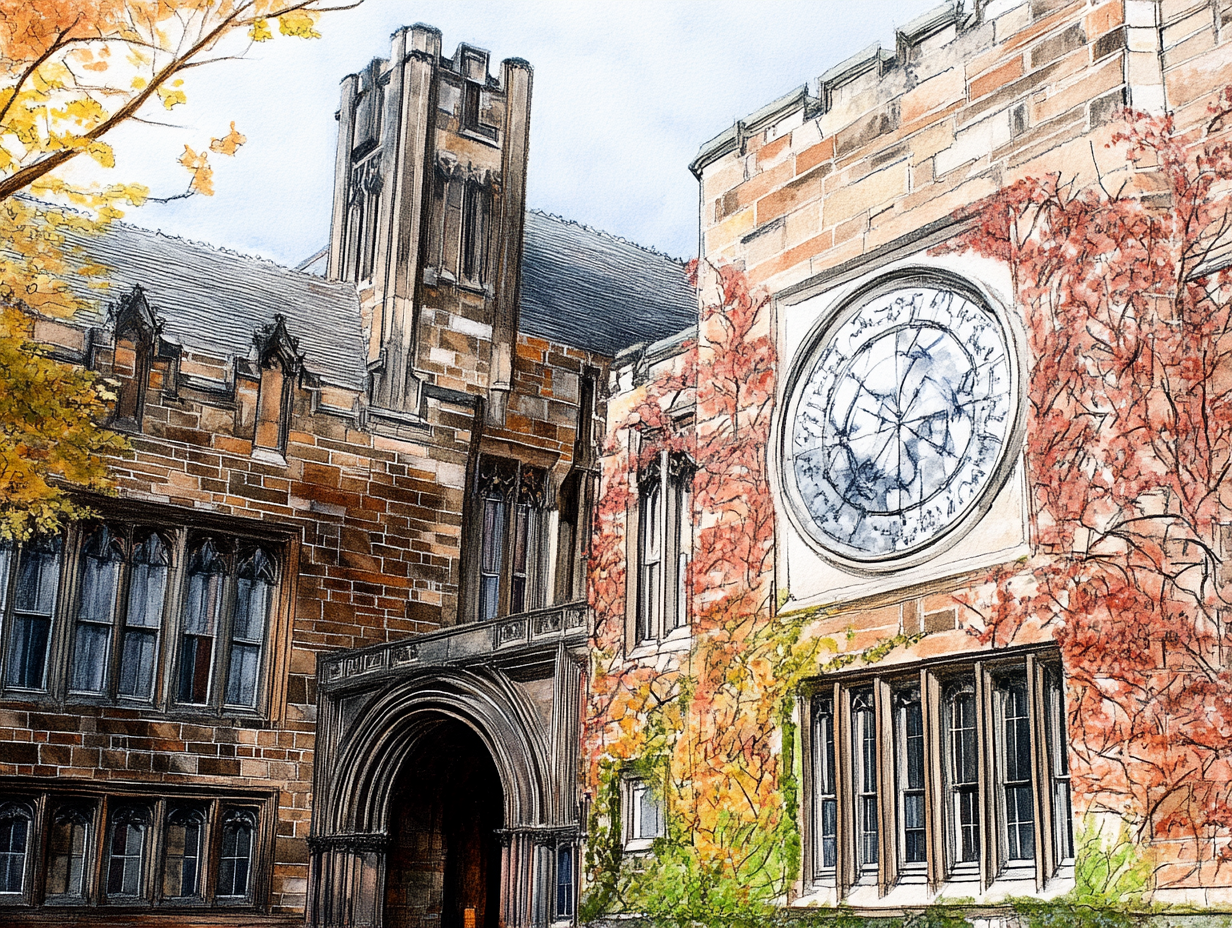
The image symbolizes a section of Yale Law School’s building complex.
4․ Programs Offered
Yale Law School offers a diverse range of educational programs tailored to students at various levels and with different interests:
- JD (Juris Doctor)
- LLM (Master of Laws)
- JSD (Doctor of Juridical Science)
- MSL (Master of Studies in Law)
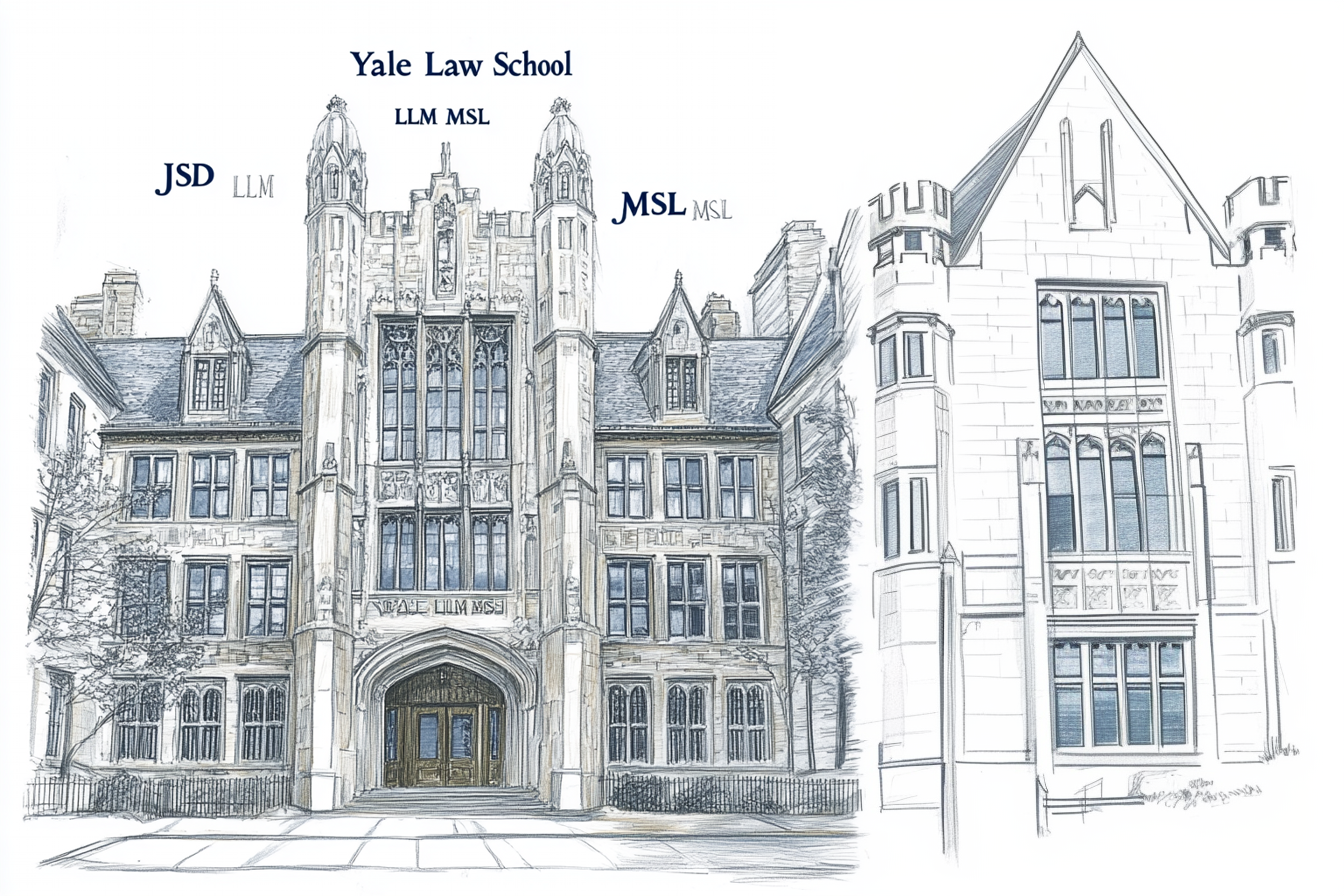
The image symbolizes Yale Law School’s legal education programs.
5․ Clinical Programs
Yale Law School is a pioneer in clinical legal education, offering over 30 clinics covering a broad spectrum of legal areas, from criminal justice to environmental protection. These clinics provide students with invaluable hands-on experience, working with real clients on actual cases.
6․ Research Centers
Yale Law School houses numerous cutting-edge research centers focused on various legal domains. Notable examples include:
- Yale Law School Center for Global Legal Challenges – spearheading research in international law and global governance.
- Yale Center for Environmental Law & Policy – dedicated to advancing environmental law and policy.
These centers not only produce groundbreaking research but also offer students unique opportunities to engage in important projects and collaborate with leading scholars.
7․ Technology and Law
Recognizing technology’s growing impact on the legal field, Yale Law School offers innovative courses and programs at the intersection of technology and law. These cover crucial areas such as cybersecurity, data privacy, legal regulation of artificial intelligence, and the digital economy.
The school’s Information Society Project leads the way in exploring technology’s influence on society and law. Students have the opportunity to participate in cutting-edge research projects and seminars in this rapidly evolving field.
8․ Law Library: An Inexhaustible Source of Knowledge
The Lillian Goldman Law Library at Yale Law School is one of the world’s most extensive law libraries. With over a million volumes, it serves as a pivotal center for legal research.
The library’s collection spans historical legal documents and contemporary legal literature, featuring rare manuscripts, early printed books, and unique legal archives.
Students and researchers have access to a vast array of electronic resources, including legal databases, scholarly journals, and digitized archives. The library’s highly qualified staff assist students in navigating the wealth of information and locating essential materials.
Beyond its role as an educational resource, the library functions as a collaborative space, featuring comfortable reading rooms, group study areas, and individual work stations.
The library continually updates and expands its collection to reflect the evolving nature of legal scholarship, ensuring Yale students and faculty have access to the most current legal information.

The image symbolizes the Lillian Goldman Library.
9․ Yale Law Journal
The Yale Law Journal, Yale Law School’s prestigious student-run publication, is widely regarded as one of the world’s premier legal periodicals. Established in 1891, it publishes articles by leading scholars, judges, and lawyers.
Publication in the journal is a distinguished honor and often significantly influences legal thought and practice. Students selected to work on the journal gain invaluable experience in legal research and writing.
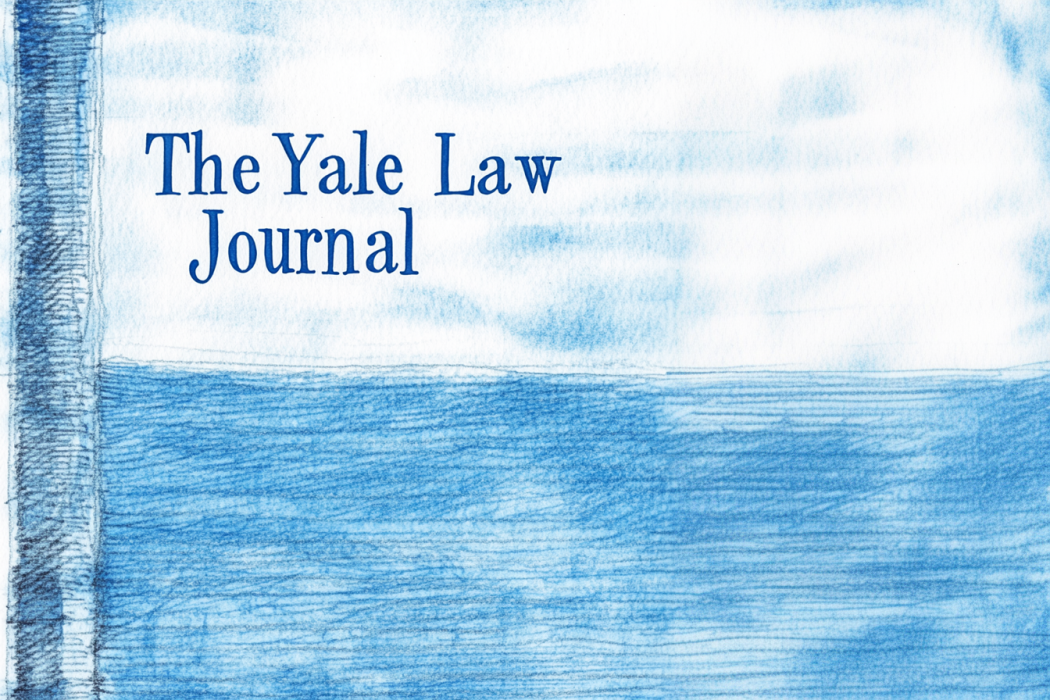
The image symbolizes the Yale Law Journal.
10․ Admission Requirements
Yale Law School maintains rigorous admission standards, contributing to its exceptional student community.
Key requirements include:
- A bachelor’s degree from an accredited university
- LSAT or GRE exam
- Proof of English proficiency (TOEFL or IELTS) for international applicants
- A comprehensive application package, including a resume, letters of recommendation, and essays
11․ Tuition and Financial Aid
For the 2024-2025 academic year, the basic budget for Yale Law School students is $103,579. This encompasses:
- Tuition: $74,044
- University administrative and activity fee: $2,325
- Room, board, and personal expenses: $22,800
- Books: $1,300
- University hospitalization insurance: $3,110
Yale Law School offers a wide array of scholarships and financial aid programs to assist students with these expenses, including:
- Need-based scholarships
- Student loans
- Work-study programs
- Graduate debt repayment assistance programs
The school is committed to ensuring that financial constraints do not impede qualified students from attending and thriving at Yale.
12․ Student Life and International Atmosphere
With international students comprising over 10% of the student body, Yale Law School offers a truly global learning environment. The school hosts numerous student organizations and clubs, fostering a vibrant and diverse community.
13․ Moot Courts: A Forge for Practical Skills
Moot courts play a crucial role in Yale Law School’s educational approach, offering students invaluable opportunities to apply theoretical knowledge in practical settings that closely simulate real trial conditions.
The school features two renowned moot court programs:
- Morris Tyler Moot Court Competition: Participants prepare extensive appellate briefs and present oral arguments on cases slated for Supreme Court review, honing their legal analysis, written composition, and oral argumentation skills.
- Thomas Swan Barristers’ Union Competition: This annual internal competition organizes mock trials and sponsors a national mock trial team. Students refine their courtroom skills, including witness examination, evidence presentation, and closing argument development.
These moot courts not only enhance students’ practical skills but also foster a competitive spirit and teamwork. They often become a cornerstone of students’ academic experience, preparing them for successful legal careers.
Notably, success in moot courts is highly valued by potential employers, as it demonstrates students’ practical skills and dedication to the profession.
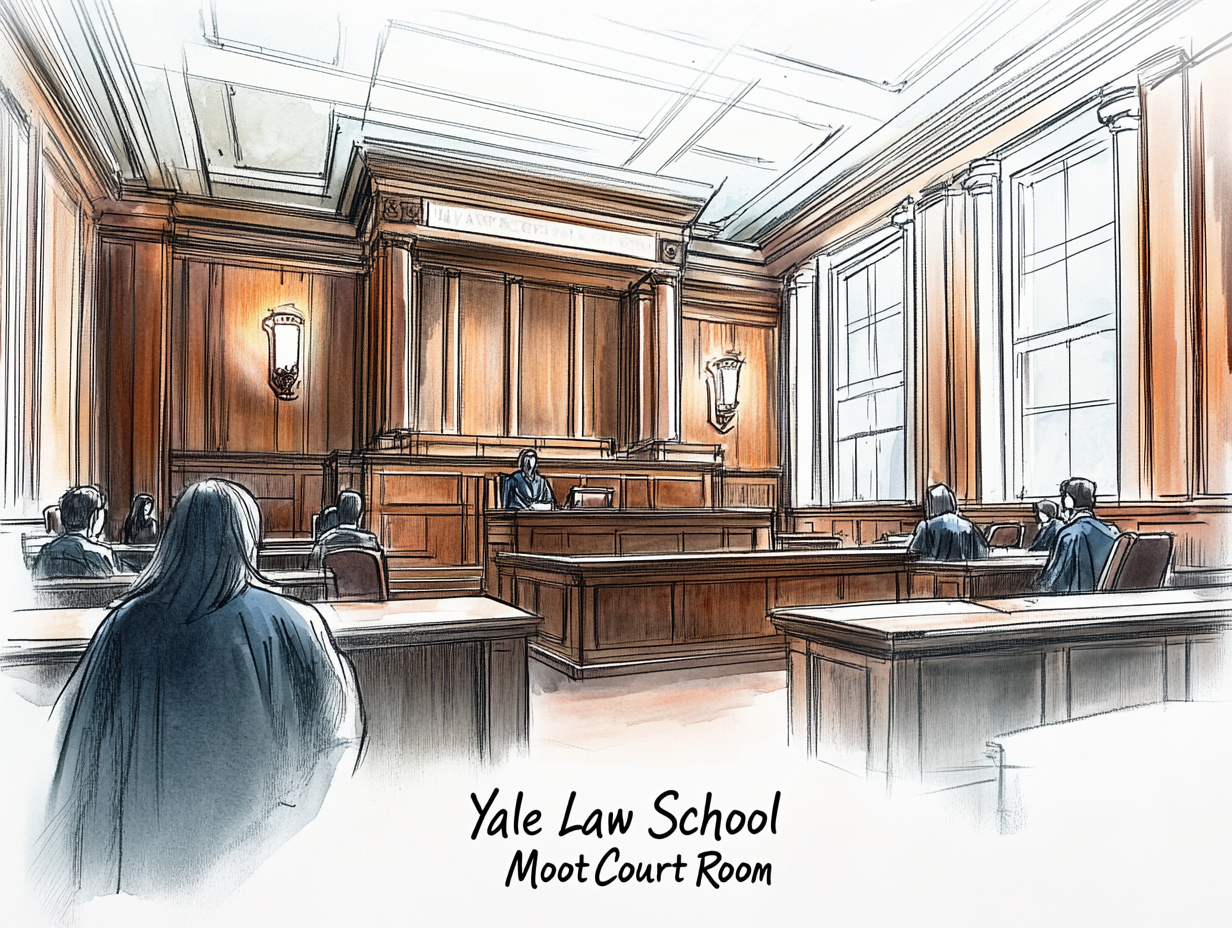
The image symbolizes Yale Law School’s moot court room.
14․ Innovative Programs
Yale Law School continues to lead in legal education innovation. Recent initiatives highlighting its forward-thinking approach include:
- A revamped curriculum featuring interdisciplinary courses that integrate law with technology, business, and social sciences.
- Implementation of VR technologies, creating virtual courtrooms for students to practice advocacy skills.
- The Artificial Intelligence and Law Laboratory: This cutting-edge facility explores AI’s impact on legal practice and develops innovative tools for lawyers.
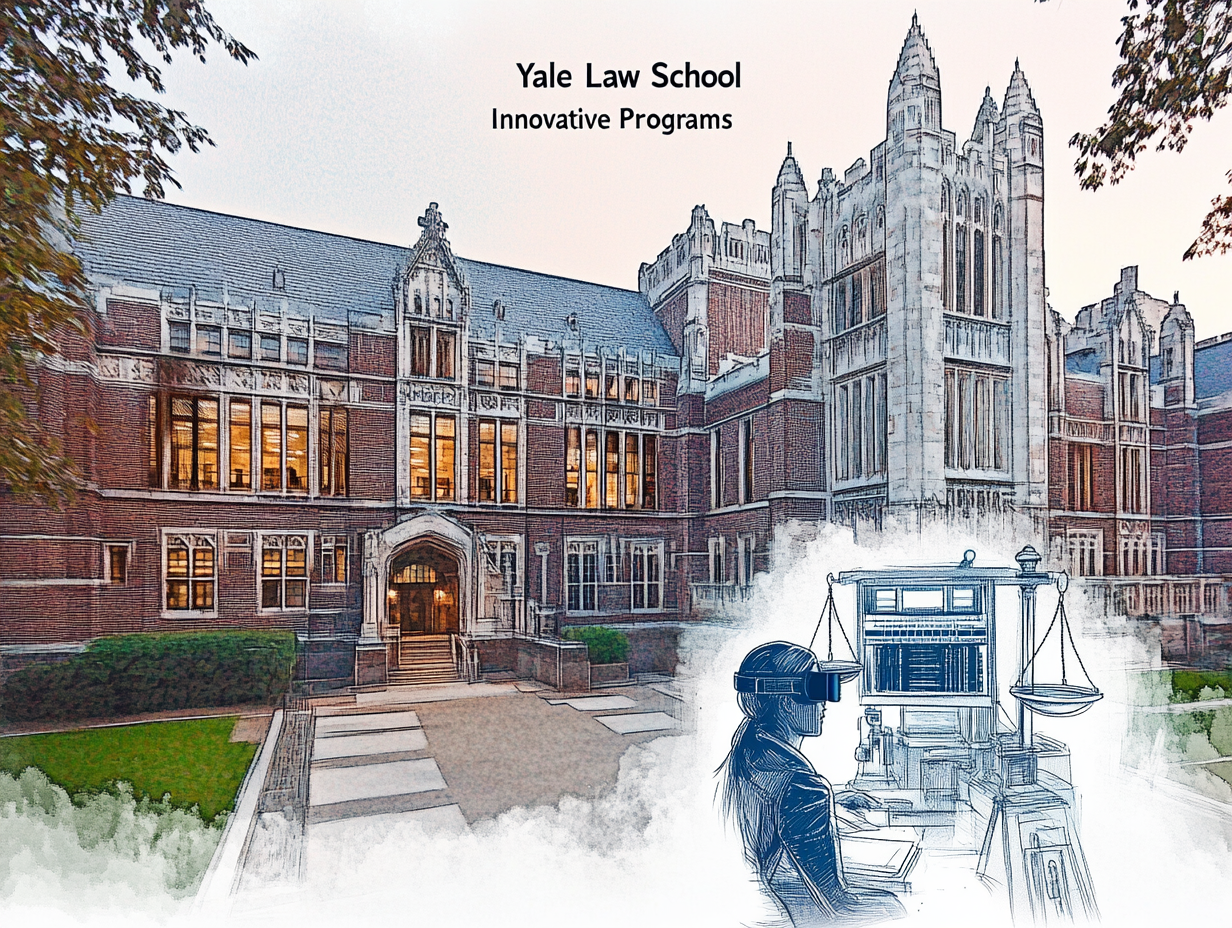
The image symbolizes Yale Law School’s innovative programs.
15․ Competitive Advantages
Yale Law School offers several unique advantages that set it apart:
- Intimate class sizes: Yale provides the smallest class sizes among top U.S. law schools, enabling personalized attention and interactive learning.
- Interdisciplinary approach: The school leverages strong connections with other Yale faculties, offering students a comprehensive education.
- Unparalleled clinical opportunities: With over 30 legal clinics, Yale surpasses many competitors in hands-on learning experiences.
- Scholarly focus: The school emphasizes legal theory and scholarly research, fostering critical thinking skills.
16․ Graduate Career Prospects and Notable Alumni
Yale Law School graduates are renowned for their successful careers and significant influence in the legal field. The school boasts impressive employment rates and counts among its alumni prominent figures such as Bill Clinton, Hillary Clinton, and Sonia Sotomayor.
17․ Information for Prospective Students from Armenia
Yale Law School welcomes international students and encourages applications from around the world, including Armenia. Armenian applicants must hold a bachelor’s degree and demonstrate English proficiency through TOEFL or IELTS scores.
18․ Conclusion
Yale Law School continues to set the gold standard in legal education, offering unparalleled educational quality, research opportunities, and professional development prospects. With its rich heritage, innovative approaches, and strong community, Yale shapes the future of law and justice by preparing tomorrow’s legal leaders.
About the Next Article
Stay tuned for the next installment in the Armenian Lawyers’ Association and Iravaban.net‘s “Law Schools Abroad” series, focusing on Stanford Law School. Tied with Yale Law School for the top spot in the U.S. News & World Report’s 2024 rankings, Stanford Law School is a powerhouse of legal education.
Our upcoming article will delve into Stanford Law School’s unique features, showcase its leading programs, and explore the exceptional opportunities it offers students, particularly international applicants. We’ll also highlight Stanford’s innovative approaches to legal education and its pivotal role at the intersection of technology and law.
Prepare to discover how Stanford Law School is shaping the future of law and creating opportunities for aspiring lawyers worldwide, including those from Armenia.

